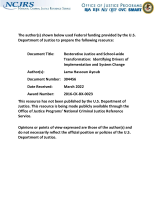Restorative justice
NIC (National Institute of Corrections) on Restorative Justice
Restorative Justice and School-wide Transformation: Identifying Drivers of Implementation and System Change
Restorative Justice in NYC Schools: An Evaluation
A Comprehensive Longitudinal Study of School Violence and the School-to-Prison Pipeline: Root Causes and Consequences of and Implications for Restorative Justice Approaches
Short-Term Effects of Restorative Justice Conferences on Post-Traumatic Stress Symptoms Among Robbery and Burglary Victims: A Randomized Controlled Trial
NIJ FY22 Research and Evaluation on the Administration of Justice: Diversion and Restorative Justice
Restorative Justice Conferencing In Rhode Island: Summary Report
Alternatives to Traditional School Discipline - Breakout Session, NIJ Virtual Conference on School Safety
On February 16-18, 2021, the National Institute of Justice hosted the Virtual Conference on School Safety: Bridging Research to Practice to Safeguard Our Schools. This video includes the following presentations:
See the YouTube Terms of Service and Google Privacy Policy
Multi-Component Efforts to Improve School Safety - Breakout Session, NIJ Virtual Conference on School Safety
On February 16-18, 2021, the National Institute of Justice hosted the Virtual Conference on School Safety: Bridging Research to Practice to Safeguard Our Schools. This video includes the following presentations:
See the YouTube Terms of Service and Google Privacy Policy
Overcoming School Safety Intervention Implementation Challenges - Breakout Session, NIJ Virtual Conference on School Safety
On February 16-18, 2021, the National Institute of Justice hosted the Virtual Conference on School Safety: Bridging Research to Practice to Safeguard Our Schools. This video includes the following presentations:
See the YouTube Terms of Service and Google Privacy Policy
School Safety Considerations for Distinct Student Populations - Breakout Session, NIJ Virtual Conference on School Safety
On February 16-18, 2021, the National Institute of Justice hosted the Virtual Conference on School Safety: Bridging Research to Practice to Safeguard Our Schools. This video includes the following presentations:
See the YouTube Terms of Service and Google Privacy Policy





